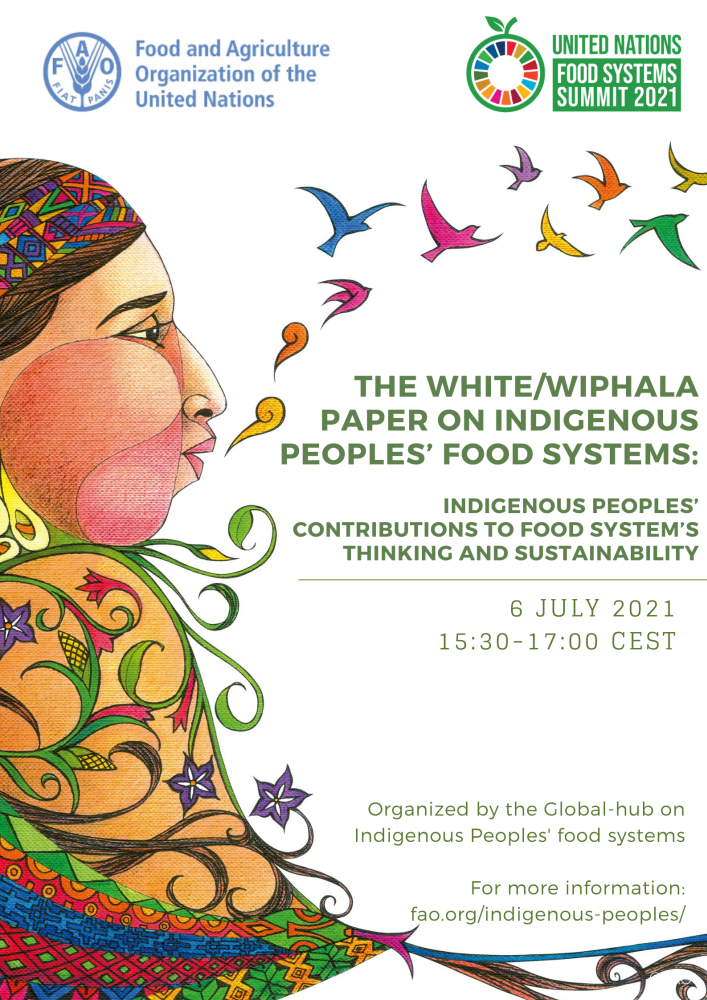This Paper advocates that lessons can be learnt from Indigenous Peoples’ approach to food, which will contribute to the resilience and sustainability of food systems worldwide, as well as supporting the wellbeing of Indigenous Peoples. In this vein, this Paper provides evidence on the sustainability of Indigenous Peoples’ food systems, including the ways in which they have proven resilient over time. The Paper articulates the importance of respecting Indigenous Peoples’ rights to ensure the preservation of their foods systems, and the value this can add to tackling emerging challenges that face mankind.
Related:
6 July 2021. Side event to the Science Days for the UN Food Systems Summit. Indigenous Peoples’ food systems: Indigenous Peoples’ contributions to food system’s thinking and sustainability
Convened by The Global-Hub on Indigenous Peoples’ Food Systems, the Alliance of Bioversity International and the International Center for Tropical Agriculture (CIAT), Center for International Forestry Research and World Agroforestry (CIFOR-ICRAF), French National Research Institute for Sustainable Development (IRD), United Nations Permanent Forum on Indigenous Issues (UNPFII), Asia Indigenous Peoples Pact (AIPP), United Nations Framework Convention on Climate Change (UNFCCC), United Nations Organization for Education, Science and Culture (UNESCO); Indigenous Partnership for Agrobiodiversity and Food Sovereignty (TIP), Sámi Parliament, Gaia Amazonas, Fund for the Development of the Indigenous Peoples of Latin America and the Caribbean (FILAC), Centre for Sustainable Development and Environment (Cenesta), INFOODS, University of Massey, Monash University, University of Cambridge, University of Greenwich Centre for Indigenous Peoples’ Nutrition and Environment: CINE McGill University.Related:
16 June 2021. #EDD21- BRAINSTORMING LAB - Indigenous Peoples’ Food SystemsIndigenous Peoples are responsible for the protection of 80% of the world's remaining biodiversity. However, the role of Indigenous Peoples’ Food Systems and territorial management practices as key elements to preserve biodiversity while generating food in sustainable ways is not well recognized yet. Since 2009, FAO is working with Indigenous Peoples and research centres to generate evidence-based information on the sustainable, nutrition and resilient elements of Indigenous Peoples’ Food Systems.
Despite having prevailed for thousands of years, Indigenous Peoples’ food systems are affected by climate change, extractive industries, intensive livestock, agriculture production, and land-use changes. This session aimed at generating an exchange of knowledge on how to preserve Indigenous Peoples’ Food systems and recognizing their contribution to the global debate on sustainable food systems and climate change.
Phrang ROY The Indigenous Partnership Coordinator
Anandi SOANS, FAO Indigenous Youth Specialist
Anne BRUNEL, FAO, Indigenous Peoples' Food Systems Specialist
Moderator: Yon FERNÁNDEZ DE LARRINOA, Chief, FAO Indigenous Peoples Unit
The European Development Days (EDD) are the EU’s leading forum on international partnerships and a key fixture for the sustainable development community. For more information, go to eudevdays.eu.


No comments:
Post a Comment